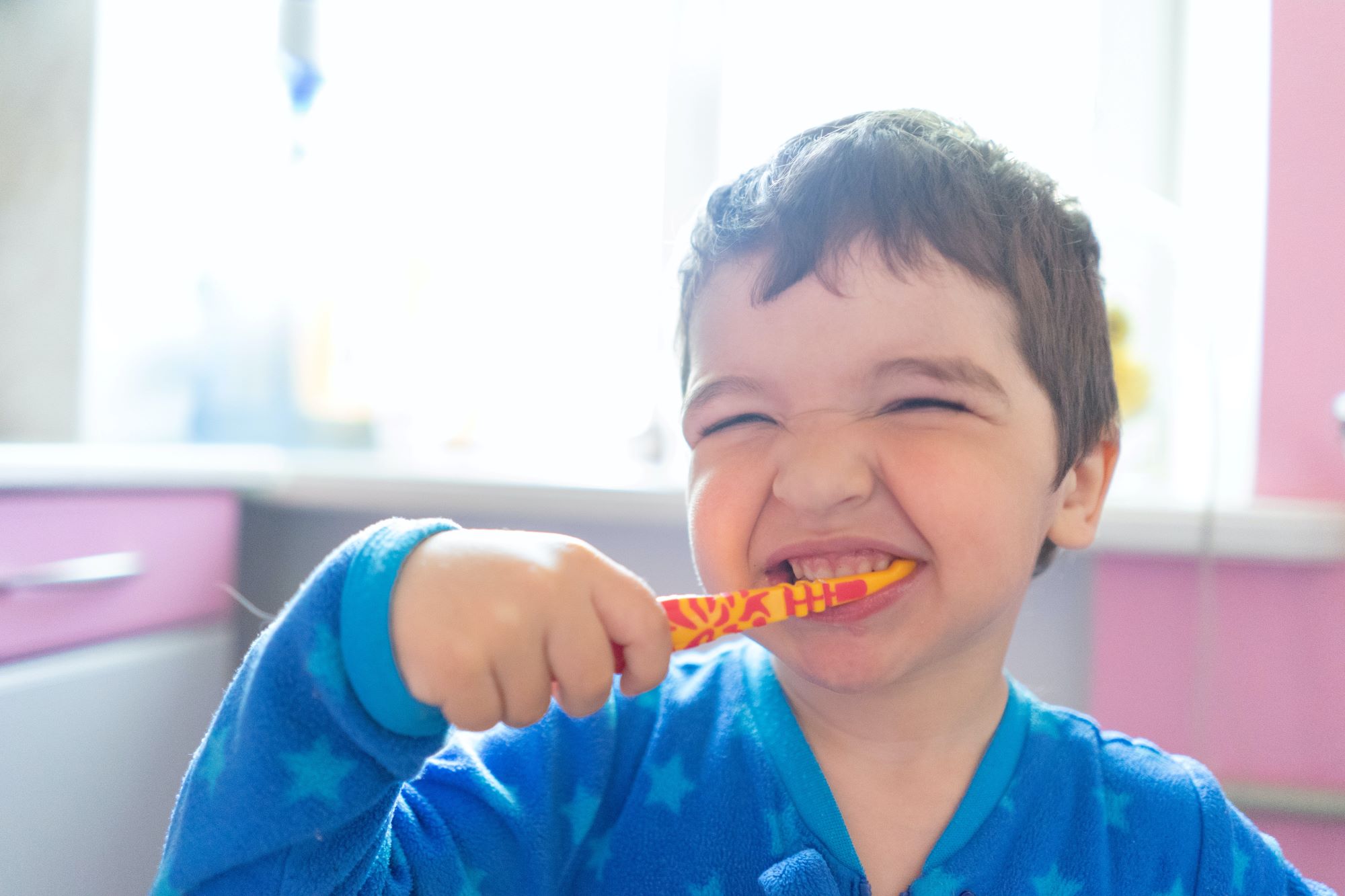
19 Mar Making Oral Hygiene Fun
6 Tips and Tricks to Encourage Dental Health for Your Young Kids
It’s the tantrum to end all tantrums: it’s time to brush their teeth.
If this is the battle you face every morning and every night with your little ones, you’re not alone. Most kids aren’t born loving to brush their teeth. Proper oral hygiene habits take time, effort, and intentionality to cultivate!
To encourage your son or daughter towards healthy habits, try these six methods.
1 – Make brushing and flossing time something they look forward to, instead of dread.
When faced with a choice between Legos and flossing, it’s pretty much a no-brainer what every four-year-old boy would choose. There’s not even a contest.
The trouble is, no child wants to stop playing in order to take care of their teeth. Brushing and flossing seems like a chore compared to the fun activities they would rather be doing.
The solution? Make brushing and flossing part of the fun.
Especially for younger children, their interaction with brushing and flossing is likely to be much more positive if you and your child brush your teeth together. This lets them act like Mommy or Daddy and learn that brushing is something everyone has to do. Another good strategy is to turn on music while you and your child are brushing teeth. Silly dances are welcome, too! The goal is to remind your child that brushing and flossing are normal, necessary, and can even be fun.
2 – Let the toothbrush be part of the fun!
To that end, toss out the boring toothbrushes! Options are plentiful for toothbrushes that will encourage your child to brush their teeth. Finding a kid-friendly toothbrush is one more step in making good oral hygiene enjoyable for your child.
Some toothbrushes they might be motivated by:
- An electric toothbrush
- A toothbrush with their favorite book or TV characters on it
- A toothbrush that blinks, buzzes, flashes, etc. to tell the child when brushing is complete
- An AutoBrush
- A differently shaped toothbrush such as the Radius Kidz Brush, particularly if your child has difficulty gripping things such as the handle of a regular toothbrush.
To put a twist on it, consider using the exciting new toothbrush as part of the incentive. Sure, your child may not like brushing and flossing. But try putting a chart on their bathroom mirror for a week. Tell them that once they’ve put a sticker on each of the days of the week, meaning they brushed and flossed every day, they can pick out a new toothbrush of their choosing. Suddenly, there’s some motivation at work.
3 – Utilize the fun of silly timers.
Do you remember being told as a child to sing your ABCs for a certain amount of time to measure when you could stop brushing your teeth? There are many suggestions for how to encourage your little ones to brush for the proper amount of time. Perhaps the simplest is an egg timer, the kind you use in your kitchen. Explain to your child that once the timer is set, they have to brush until the timer goes off.
Just because it’s a simple solution doesn’t mean it can’t be silly.
If you haven’t searched the internet lately for a creatively-shaped egg timer, you’re missing out. These things come in all shapes and sizes, from fruits and veggies to Kitchen-Aid mixers to Hershey’s Kisses to actual eggs!
Whether you use it as a reward for consistent brushing or flossing or simply give one to your child as an encouragement, silly egg timers may be your secret weapon. Teach your child how to set their silly timer to the ADA-recommended length for brushing your teeth—two minutes. Then, they’ll have the structure of knowing how long they have to brush their teeth for, and the fun of it coming from a Hershey’s Kiss!
4 – Use story time to your advantage.
You’re not alone in wanting your child to have healthy teeth and to understand the importance of taking care of them. Thankfully, there are plenty of kid-oriented resources to help you out. Next time you’re at the library, ask your librarian for suggestions of books that encourage good oral hygiene habits for kids. For starters, try these:
- The Tooth Book by Dr. Seuss
- The Berenstain Bears Visit the Dentist by Stan and Jan Berenstain
- Sugarbug Doug: All About Cavities, Plaque, and Teeth by Dr. Ben Magleby
- Brush Your Teeth, Please by Jean Pidgeon
- Open Wide: Tooth School Inside by Laurie Keller
5 – Play dentist and patient.
You may have a tendency to dismiss your kid’s imaginative play as simply them being a kid. But what if you could harness that imaginative power towards their own education and benefit?
As it turns out, playing dentist and patient with your child could be one of the most powerful tools you have when it comes to this issue. The Tessa International School explains how, “Role-playing is a multi-faceted teaching and playing activity that allows children to grow and learn through imaginative scenarios. Since these activities place children in interactive situations requiring them to work out solutions and reactions on their own in order to play out the role, this type of play often brings about a deeper understanding on topic of play.”
Despite the fact that they’re learning so much, kids still seem to love it! The Pittsburgh Parent points out that, “Role-playing is almost always an instant hit amongst children, even when teaching them the importance of dental health.”
So next time, if your kid doesn’t want to brush their teeth, try letting them brush yours! Or a baby doll’s, or a model mouth’s. It doesn’t have to be difficult! You can purchase a few dentist toys to help you, or simply make them up. Don’t underestimate the power role-playing can have.
6 – Make use of games and experiments.
Along the same lines, there are plenty of games and experiments out there to help you teach your son or daughter about the importance of taking care of their teeth. Older children may prefer a teeth-related science experiment; for younger children, consider something like this, a teaching tool suggested by America’s ToothFairy:
Cut apart a white styrofoam egg carton to make little “teeth”. Give each child their own “tooth” and have them select a snack from a list of foods that include both tooth-friendly and unhealthy options. If they select a tooth-friendly food, use a highlighter or dry-erase marker to color food spots on their tooth. If they select an unhealthy food, use a Sharpie or permanent black marker to color food spots on their tooth. Now give the child a toothbrush to brush away their food spots. Explain that the healthy foods are easy to brush away but the unhealthy foods are hard to brush away and can lead to cavities.
This game and plenty of others like it can help your child associate positive feelings with taking care of their teeth, learn what foods help and hurt, and how they can take responsibility for their own oral hygiene.
Empowering Your Kid
All of these tips and tricks revolve around helping your child see that taking care of their teeth is a necessary and normal part of life, and can even be fun. By taking the time to explain and encourage oral hygiene for our children, we empower them to take agency in their own dental health. In turn, they can build good habits that will last a lifetime.

About Our Team
Our team of dental experts has well over 30 years of combined experience in the field of dentistry. To learn more about them, please visit the team pages for Hephzibah, Washington Road, Summerville, and Medical District locations.

Sorry, the comment form is closed at this time.